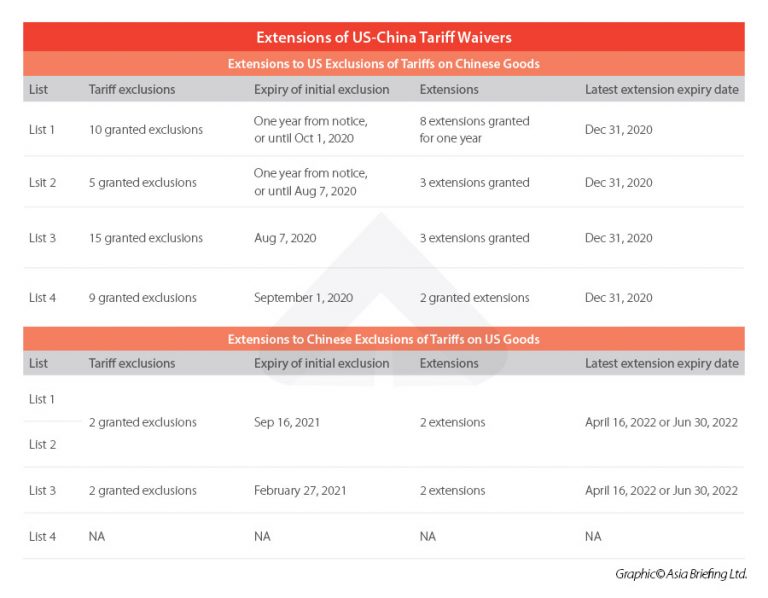China's Targeted Tariff Exemptions For US Imports

Table of Contents
The Rationale Behind China's Targeted Tariff Exemptions
China's strategic use of tariff exemptions on US imports is a multifaceted issue driven by several key factors. These exemptions aren't arbitrary; they reflect a complex interplay of economic needs, political maneuvering, and responses to US trade actions. Understanding these motivations is key to deciphering China's trade policy.
-
Domestic Supply Shortages: In certain sectors, China may lack the domestic capacity to meet its demand. Tariff exemptions on specific US imports can bridge this gap, ensuring continued production and preventing disruptions to essential industries. For example, reliance on specific US-sourced components for manufacturing high-tech goods could necessitate exemptions to avoid production slowdowns.
-
Strategic Industries Needing Specific US Inputs: Some industries deemed crucial to China's economic development may require specialized inputs unavailable domestically or at a competitive price. Tariff exemptions on these essential inputs allow these strategic sectors to remain competitive globally. This is particularly relevant in high-tech sectors like semiconductors, where US expertise and technology play a critical role.
-
Political Considerations and Trade Negotiations: Tariff exemptions can serve as bargaining chips in bilateral trade negotiations. Granting exemptions can be used to incentivize concessions from the US, demonstrating flexibility and potentially de-escalating trade tensions. This strategic use of tariff exemptions highlights the intertwined nature of trade and diplomatic relations.
-
Response to US Tariff Actions: China's use of targeted tariff exemptions can also be viewed as a response to US tariff actions. By strategically exempting certain goods, China aims to mitigate the impact of US tariffs on its economy and specific industries, while maintaining leverage in ongoing trade discussions. The tit-for-tat nature of tariff actions makes understanding this reciprocal dynamic critical.
Sectors Most Affected by China's Tariff Exemptions
The impact of China's tariff exemptions isn't uniform across all sectors. Certain industries have benefited disproportionately, leading to significant shifts in import patterns and market dynamics.
-
Agriculture (soybeans, etc.): The agricultural sector, particularly soybean imports, has experienced significant fluctuations due to China's tariff policies. Exemptions on soybean imports have been instrumental in maintaining supply for China's livestock industry. The volume of these exemptions reflects the importance of agricultural trade in US-China relations.
-
Technology (semiconductors, etc.): The technology sector is another area where China's tariff exemptions have played a crucial role. The reliance on US-made semiconductors and other advanced technologies has necessitated exemptions to ensure the continued functioning of key industries. This area is particularly sensitive given the strategic importance of technology in national development.
-
Manufacturing (specific examples): Specific manufacturing sectors, especially those relying on specialized US components or machinery, have also been recipients of tariff exemptions. For instance, certain automotive parts or specialized industrial equipment might qualify for exemptions due to a lack of suitable domestic alternatives. This highlights the reliance of certain manufacturing sectors on foreign inputs.
The Application Process and Criteria for Tariff Exemptions
The application process for tariff exemptions in China is a complex bureaucratic procedure, requiring meticulous documentation and careful adherence to specific criteria.
-
Documentation Required: Importers typically need to provide extensive documentation, including proof of essentiality, lack of suitable domestic alternatives, and evidence of the goods' intended use. The precise requirements can vary depending on the product and the relevant regulatory body.
-
Review Process and Timeline: The review process can be lengthy and opaque. The timeline for approval can vary considerably, potentially causing delays and uncertainty for businesses. Transparency in this process is crucial for improving predictability and reducing business risk.
-
Criteria for Approval: Key criteria for approval usually include demonstrating the essentiality of the imported goods for production or consumption, proving the lack of comparable domestic substitutes, and providing a detailed justification for the exemption request. Meeting these criteria requires diligent preparation.
-
Transparency of the Process and Any Challenges Faced by Applicants: While official government resources might provide some information, the actual application process can be challenging for foreign businesses due to language barriers, bureaucratic complexities, and a lack of readily accessible information.
The Economic and Geopolitical Implications of China's Tariff Exemptions
China's targeted tariff exemptions have far-reaching economic and geopolitical implications, affecting both China and the US, as well as global trade dynamics.
-
Impact on Inflation: Exemptions can affect inflation by influencing the price of essential goods and inputs. The availability of cheaper imports due to exemptions can help keep inflation in check. However, unexpected shifts in exemption policies could create instability.
-
Effect on Supply Chains: Exemptions significantly impact global supply chains. They can stabilize supply chains reliant on US goods, ensuring continuity of production and economic activity. However, unpredictable changes in exemptions could disrupt these chains.
-
Influence on Bilateral Trade Relations: Tariff exemptions are directly related to bilateral trade negotiations. They serve as both a tool and a consequence in the ongoing US-China trade relationship. Understanding their use is vital to analyze the overall state of trade relations.
-
Geopolitical Ramifications for Global Trade: China's approach to tariff exemptions reflects broader geopolitical strategies, influencing global trade patterns and the overall balance of power. This aspect highlights the interconnectedness of trade policy and international relations.
Conclusion
China's targeted tariff exemptions for US imports represent a complex and dynamic aspect of the ongoing US-China trade relationship. These exemptions are driven by a multitude of factors, from addressing domestic supply shortages to employing strategic tools in trade negotiations. The impact extends beyond individual sectors, influencing inflation, supply chains, bilateral relations, and global geopolitical dynamics. Understanding the rationale, application process, and consequences of these exemptions is crucial for navigating this complex landscape.
Call to Action: Staying informed about China's evolving trade policies, specifically regarding China's tariff exemptions, is essential for businesses engaged in US-China trade. Regularly monitor updates on official government websites and consult with trade specialists to navigate the complexities of these dynamic trade relations. Further research into the specifics of China's tariff exemptions and their future trajectory is crucial for informed decision-making.

Featured Posts
-
 The Metropolitan Museum Of Arts Monstrous Beauty A Feminist Analysis Of Chinoiserie
Apr 28, 2025
The Metropolitan Museum Of Arts Monstrous Beauty A Feminist Analysis Of Chinoiserie
Apr 28, 2025 -
 Deportation To Russia Harvard Researchers Legal Battle In Louisiana
Apr 28, 2025
Deportation To Russia Harvard Researchers Legal Battle In Louisiana
Apr 28, 2025 -
 Syracuse Mets Acquire Dedniel Nez Megill Returns For New York
Apr 28, 2025
Syracuse Mets Acquire Dedniel Nez Megill Returns For New York
Apr 28, 2025 -
 Canadian Trade Mission To Southeast Asia Unlocking Energy Potential
Apr 28, 2025
Canadian Trade Mission To Southeast Asia Unlocking Energy Potential
Apr 28, 2025 -
 The Michael Jordan Effect How Criticism Boosts Denny Hamlins Performance
Apr 28, 2025
The Michael Jordan Effect How Criticism Boosts Denny Hamlins Performance
Apr 28, 2025
